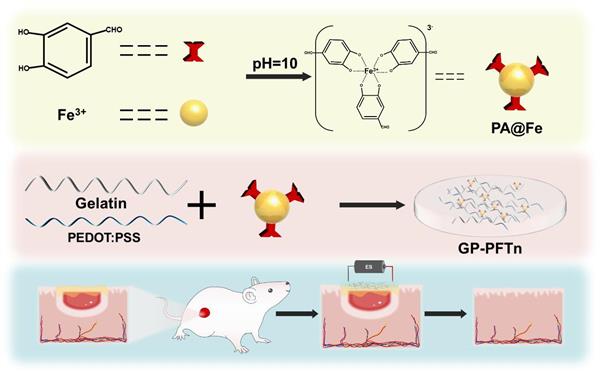作者:Yanting Jing, Yanzhen Lou, Xinxiang Chai, Khaydar E. Yunusov, Yanfang Sun, Liming Ruan, Guohua Jiang
关键字:conductive hydrogels; wound dressing; electrical stimulation; self-healing
论文来源:期刊
具体来源:Biomedical Materials and Devices
发表时间:2024年
Abstract: Hydrogels possessing both conductive characteristics and notable self-healing to achieve high wound closure effectiveness is highly desirable in clinical applications. In this work, the stretchable?and self-healing conductive?hydrogel dressings were designed through dual-dynamic-bond cross-linking. A stable tricomplex molecule (PA@Fe) could be formed by the pH-sensitive coordinate bond (catechol-Fe) between catechol groups in PA and ferric ions (Fe3+). And the conductive hydrogels with stretchable?and self-healing properties could be fabricated by cross-linking of aldehyde groups in PA@Fe with gelatin through dynamic Schiff base bonds and integration of poly(3,4-ethylenedioxythiophene): poly(styrene sulfonate) (PEDOT:PSS). The as-prepared hydrogels exhibited good self-healing, adhesive ability, biocompatibility, hemostatic and electrical conductivity. The in vivo evaluation in a full-thickness skin wound model revealed the high wound closure effectiveness and post-wound-closure care of the smart hydrogels, demonstrating its great potential in dealing with full-thickness skin wounds.
Keywords: conductive hydrogels; wound dressing; electrical stimulation; self-healing
